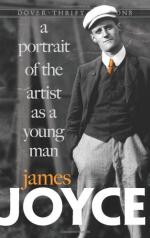The sad quiet grey-blue glow of the dying day came through the window and the open door, covering over and allaying quietly a sudden instinct of remorse in Stephen’s heart. All that had been denied them had been freely given to him, the eldest; but the quiet glow of evening showed him in their faces no sign of rancour.
He sat near them at the table and asked where his father and mother were. One answered:
—Goneboro toboro lookboro atboro aboro houseboro.
Still another removal! A boy named Fallon in Belvedere had often asked him with a silly laugh why they moved so often. A frown of scorn darkened quickly his forehead as he heard again the silly laugh of the questioner.
He asked:
—Why are we on the move again if it’s a fair question?
—Becauseboro theboro landboro lordboro willboro putboro usboro outboro.
The voice of his youngest brother from the farther side of the fireplace began to sing the air oft in the stilly night. One by one the others took up the air until a full choir of voices was singing. They would sing so for hours, melody after melody, glee after glee, till the last pale light died down on the horizon, till the first dark night clouds came forth and night fell.
He waited for some moments, listening, before he too took up the air with them. He was listening with pain of spirit to the overtone of weariness behind their frail fresh innocent voices. Even before they set out on life’s journey they seemed weary already of the way.
He heard the choir of voices in the kitchen echoed and multiplied through an endless reverberation of the choirs of endless generations of children and heard in all the echoes an echo also of the recurring note of weariness and pain. All seemed weary of life even before entering upon it. And he remembered that Newman had heard this note also in the broken lines of Virgil, giving utterance, like the voice of nature herself, to that pain and weariness yet hope of better things which has been the experience of her children in every time.
* * * * *
He could wait no longer.
From the door of Byron’s public-house to the gate of Clontarf Chapel, from the gate of Clontail Chapel to the door of Byron’s public-house and then back again to the chapel and then back again to the public-house he had paced slowly at first, planting his steps scrupulously in the spaces of the patchwork of the footpath, then timing their fall to the fall of verses. A full hour had passed since his father had gone in with Dan Crosby, the tutor, to find out for him something about the university. For a full hour he had paced up and down, waiting: but he could wait no longer.




